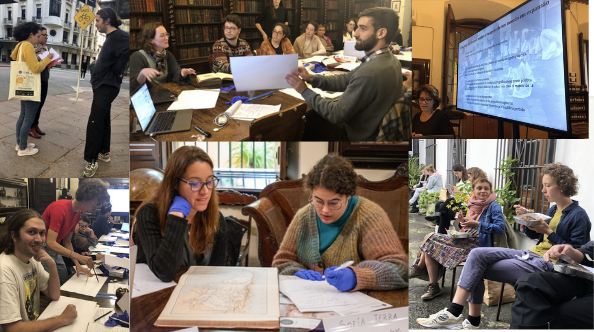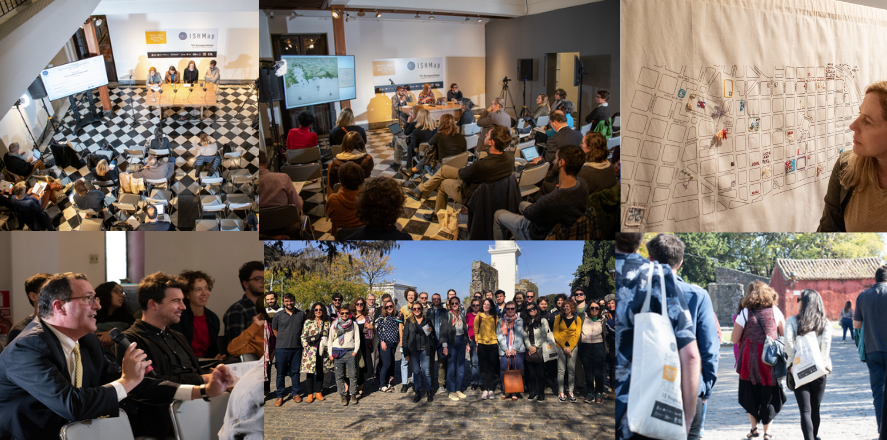
ISHMap VII Symposium and II Workshop 2023
Intersections in Map History
Max Planck Institute for the History of Science (MPIWG), Berlin, Germany
July 10-15, 2023
#ishmap2023
| * Register for the Symposium * Event Calendar * Program Schedule * Full Program (Abstracts) | * Attending the Symposium * Practical information * Venues * Conveners |
EVENT CALENDAR
| June 28, 2023 | Final date to pay for Gotha fieldtrip |
| July 1, 2023 | Registration for non-participants (attendees) closes. [In person registration closed; event is full] |
| July 10-11, 2023 | ISHMap Workshop II (2023) Harnack House, Max Planck Society conference venue Max Planck Institute for the History of Science |
| July 12, 2023 (afternoon) | Symposium Keynote and ISHMap General Meeting (hybrid), Staatsbibliothek zu Berlin (Unter den Linden) |
| July 13-14, 2023 | ISHMap VII Symposium (in person), Harnack House, Max Planck Society conference venue |
| July 15, 2023 | Day trip to Gotha, Germany, to visit the Perthes Collections at the Gotha Research Library, University of Erfurt |

The ISHMap II Workshop (July 10-11) for early career professionals (scholars, curators, archivists, and librarians) working in the history of cartography, will precede the Symposium. Approximately twenty participants, selected from a pool of applicants, will engage on hands-on activities led by five experts in the fields of map scholarship and curation. The MPIWG generously funded travel and lodging for two emerging scholars. The Workshop is convened by Jordana Dym (Skidmore College), Chair, ISHMap Trustees with support by Vera Dorofeeva-Lichtmann (CNRS/MPIWG) and Diana Lange (University of Hamburg). (Images from ISHMap 2022, Montevideo, Uruguay)
Workshop Sessions:
Shih-Pei Chen | Working on Historical Maps Digitally
Matthew Edney | Map History’s Narrative Structures
Diana Lange & Oliver Hahn | Maps and Colors
David Weimer | Art Making and the Limits of the Map
Workshop Session abstracts
The VII ISHMap Symposium welcomes over forty poster and paper presentations, many of which connect directly to two themes that benefit from the research context and facilities of the MPIWG: “materiality” and cross-cultural research. The first theme calls attention to the importance of material attributes of maps, such as constraints that may be overlooked as scholars work increasingly with digitized sources. The second encourages dialogue and exchange between scholars working with comparable questions, sources or methodologies across different geographic spaces and contexts. (Images from ISHMap 2022, Montevideo, Uruguay)

July 12, 2023, 1:30pm
Wilhelm von Humboldt Saal, Staats Bibliothek zu Berlin, Unter den Linden
The VII ISHMap Symposium opens on July 12 with the ISHMap Society General Meeting and Keynote talk. Registered participants will also attend two Symposium sessions and a visit to the Map Room, led by Associate Director of the Map Collection Markus Heinz.
ISHMap General Meeting
1:30 – 2:30 PM
Open to ISHMap Society Members and Symposium Participants
Hybrid (for Society members)
Keynote 
Richard A. Pegg & Elke Papelitzky
Mapping Heaven and Earth: The Blue Maps of China
July 12, 2023, 6:30pm
Wilhelm von Humboldt Saal, Staats Bibliothek zu Berlin, Unter den Linden
Hybrid. Free and open to the public.
In person attendees who have registered for the symposium will
be given priority in seating, if needed.
July 13-14, 2023, 8:30 am – 5:30 pm
Harnack House, The Conference Venue of the Max Planck Society
Max Planck Institute for the History of Science (MPIWG)
Ihnestr. 16-20 – 14195 Berlin
How to get to Harnack House
Symposium Schedule (rev. July 11, 2 pages)
Symposium Program with Presentation Abstracts (60 pages)
Sessions
July 12 (StaBi): Session 1: Mapping Early Modern China
Session 2: Assembly and Collections
July 13 (Harnack): Session 3: Movement Matters
Session 4: Data Driven
Session 5: Blending Knowledge?
Poster Session
Session 6: Rerouting
July 14 (Harnack): Session 7: Surveying Imperial Borderlands
Session 8: Border Mapping
Session 9: Maps in 20th-century Books
Session 10: Material Matters
Session 11: Shaping Spaces
July 15 (Gotha): Field trip to Perthes Research Collection, Gotha, Germany
Hosted by Dr. Petra Weigel, Curator of the Perthes Collection,
Gotha Research Library and Prof. Iris Schröder, Director,
Centre for Transcultural Studies / Gotha Perthes Collection
Cost : 50 Euros. Pre-registration and payment by June 28 required.
ATTENDING THE SYMPOSIUM
Building on the successful 2022 VI Symposium and I Workshop held in Montevideo, Uruguay, we are pleased to plan an in-person event, with limited opportunities to engage online. Coffee breaks and lunch will be provided, with generous support of the MPIWG.
There is no charge to participate in the Symposium. To support the Society’s work, ISHMap invites attendees to join the Society (20 UK pounds a year); voluntary donations to support those with limited resources are also welcome. Click here to pay online; cash only will also be accepted in person.
For information about travel to and within Germany, as well as venue location and possible lodging, please consult the Practical Information page.
VENUES
The Max Planck Institute for the History of Science
Founded in 1994, the Max Planck Institute for the History of Science (MPIWG) in Berlin is one of more than 80 research institutes administered by the Max Planck Society in the sciences and humanities. The Institute has become an internationally recognized center of the history of science and technology studies. Recently, Department III of the MPIWG (Artifacts, Action, Knowledge), directed by Dagmar Schäfer, explores links between the history of science and the history of maps with a focus on East Asia and the Middle East.
Completed and ongoing map-related projects include (1) Translating Terroirs: East Asia between Autochthonous and European Cartographic Language (2019-2022; principal investigator, Dagmar Schäfer, Director of the Dept. III of the MPIWG, and coordinator, Vera Dorofeeva-Lichtmann coordinator); (2) digital humanities projects directed by Chen Shih-pei Chen related to Chinese Local Gazetteers (LoGaRT), particularly one on graphical representations, including maps, in the Local Gazetters (“Tu (圖)” in Local Gazetteers) and another on the so-called Field Allocation system of the Earth-Heaven correspondences represented as maps (Fenye in Local Gazetteers) and (3) a project on Visualization and Material Cultures of the Heavens in Eurasia and North Africa (4000 BCE–1700 CE), including astronomical maps which includes a useful database of images of the heavens( Sonja Brentjes, director)
Since 2016, due to the initiative of Dagmar Schäfer, the MPIWG collects maps relevant to East Asia. Preference is given to items not easily found in other map collections, or items relation to the on-going research projects. See the map collection of the MPIWG here.
Conveners
Jordana Dym, Skidmore College (US), Chair, ISHMap Trustees
Vera Dorofeeva-Lichtmann, CNRS (France); MPIWG (Germany)
Diana Lange, Universität Hamburg (Germany); Humboldt University (Germany)
Dagmar Schäfer, MPIWG, Director, Dept. III (Germany)
Scientific Committee
Jordana Dym, Skidmore College (US), Chair, ISHMap Trustees
Andréa Doré, Universidade Federal do Paraná (Brazil, ISHMap Trustee)
Vera Dorofeeva-Lichtmann, CNRS (France); MPIWG (Germany)
Diana Lange, Universität Hamburg (Germany); Humboldt University (Germany)

View of the city of Berlin, ca. 1716.
About the Maps.
The banner map, a plan of Berlin, was published by Verlag Homann Heirs
Die Königl. PREUS. u. Churf. BRANDENBURG. RESIDENZ-STADT BERLIN,
for the first time in 1739/40. Below the plan, a view of the city brings it to life.
Staatsbibliothek zu Berlin, Kart. X 17324

